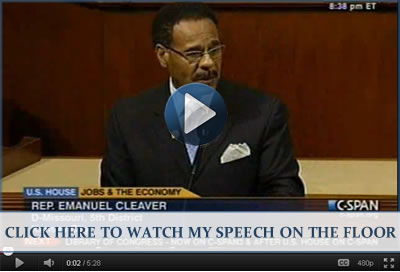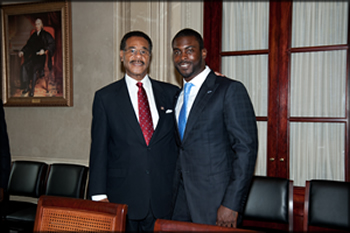Join me tomorrow for Coffee with Cleaver in Independence!

Since taking office, I have visited a coffee shop nearly once a month. In every part of the District, from Lone Jack to Sugar Creek, Midtown to Lee's Summit, it has become a great way for me to hear the concerns of the people I am proud to serve. This month's coffee is hosted by Dave's Bakery & Deli, at 214 W Maple Avenue, on the Historic Independence Square. Please come by this Saturday morning, from 8-10 AM, to share your thoughts with me, one-on-one over a cup of coffee -- or perhaps some iced tea.
Cleaver Joins Delegations from Missouri, Kansas on Missouri River Working Group
This week, I was proud to become a part of a bipartisan group, with ten of my colleagues from Missouri and Kansas. Together we will serve on a five state congressional working group that will provide lower basin river communities a united voice when it comes to management of the Missouri River.
I am not always a big fan of these sorts of working groups—in Washington, the first answer to every problem seems to be, ‘form a committee.' And you know how that turns out. In this case, I welcome the chance to work with my fellow representatives from Missouri, U.S. Reps. Blaine Luetkemeyer, Jo Ann Emerson, Todd Akin, Lacy Clay, Sam Graves, Russ Carnahan, Vicky Hartzler and Billy Long, along with Kansas U.S. Reps. Lynn Jenkins and Kevin Yoder, who have all agreed to serve on the panel created by U.S. Rep. Kristi Noem of South Dakota. We have got to protect communities alongside the Missouri River, and work toward a better, fairer solution, that places the safety and livelihood of those who live and work along the river as paramount. I took the time to speak on the House Floor this week about this issue, and I hope you take a moment to watch the video or read my remarks.
Congressman Cleaver Speaks on Missouri River Flooding

Madam/Mr. Speaker, I rise today to focus attention on a tragedy occurring in my home state and throughout the Midwest region. Currently farmland and homes are underwater along the Missouri River, from Montana to my home state of Missouri. Record snow melt runoff this spring along with unexpected record rainfall in the upper river basin filled up the reservoirs in eastern Montana and the Dakotas and forced the Army Corps of Engineers to release large amounts of water from the reservoirs to keep them from overflowing. That excess water has flowed downstream, creating a path of destruction in its wake.
Levees have been breached in Iowa and Nebraska and in Northwest Missouri, causing flooding of farmland, road closures including Interstate 29, and evacuations. More than 500,000 acres of land have flooded in the seven states along the river. The high waters have moved eastward and further downstream in Missouri, causing high waters and flooding in Ray, Saline, and Carroll Counties.
With rivers still running above flood stage and soils saturated, forecasters have predicted this summer flooding season could rival the worst in United States history. In the "Great Flood of 1993," record-breaking floods from April to August cost more than $25 billion in damages in at least nine states.
The excessive high temperatures sweeping across the nation this week cannot erase concerns about river flooding. These high river levels are not going away any time soon, and neither is the risk of flooding. There will be sustained high water along the Missouri River through August as the reservoirs continue releasing high volumes of water. Due to this high water and saturated soil, just a small amount of rain could trigger more flooding in areas that have already seen record flooding this 2011 season, according to the National Weather Service. Additionally, levees that so far have not breached are still at risk because continued high water levels can saturate and erode levee foundations or seep underneath.
Obviously we cannot plan for every natural disaster. However, we have the responsibility to take preventative measures whenever possible. The original purpose of these upper Missouri basin dams was flood protection. Over the years other priorities may have slipped in; however, I believe now is the time to re-evaluate the Corps' management plans and once again place the safety and livelihood of people who live or work along the river first.
Reservoir levels need to be lower between October and April, so that fewer releases are needed during the spring rain season. A goal of target releases should be that they not exceed any given flood stage downstream. And, if releases above flood stage levels are required, then a maximum flow of no more than 5 feet over given flood stages for no longer than 15 consecutive days could be set, followed by 5 consecutive days below given flood stages. This cycle could be repeated as necessary and would reduce downstream damages. This or other contingency planning is needed to prevent flooding events such as this year's from happening again. |
Concerned Clergy Coalition Partners with Community Blood Center
Did You Know?
Every 3.9 minutes someone receives a blood transfusion?
It takes less than an hour to donate whole blood.
Whole blood has a 42-day shelf life which creates a constant demand on the supply.
You can donate whole blood every 56 days
What can you do?
Donate blood regularly, up to four times a year
Encourage family and friends to donate
Enroll in the Gift of Smiles
Program to help children with Sickle Cell disease
Visit savealifenow.org or call 816.753.4040 for more information |
|
Tomorrow, I will join the Concerned Clergy Coalition at a blood donation event to help increase blood donations and awareness in the African-American community. The Concerned Clergy Coalition is a group of pastors, ministers and other faith leaders throughout the Greater Kansas City Metropolitan Area who meet on a monthly basis in an effort to create unity among faith-based organizations and the church community. The Coalition works to empower themselves and the community with knowledge, direction, economic development and commits to addressing concerns that affect the citizens of Kansas City.
Community Blood Center is the local non-profit supplier of blood services for 70 hospitals throughout Kansas City, Jefferson City, St. Joseph, Lawrence and Topeka. The Community Blood Center is a member of America's Blood Centers, a national network of independent blood centers that provides over half of the nation's blood supply; the AABB, and the Blood Centers of America.
The event will be held tomorrow, Saturday, July 23, at noon at Community Blood Center's Donation Center at 4040 Main Street in Kansas City. In attendance will be Concerned Clergy, including Pastor Michael E. Brooks who also serves as the 5th District City Councilman in Kansas City, Bishop Frank Douglas, Pastor of Beth-Judah Ministries, Pastor Emanuel Cleaver III of the St. James United Methodist Church and Pastor Eric D. Williams of the Calvary Temple Baptist. Pastor Williams was recently appointed by Governor Jay Nixon to serve on the 16th Circuit Judicial Commission.
A Route to Redemption

Congressman Emanuel Cleaver, II, pictured here with Philadelphia Eagles Quarterback Michael Vick, who, on his redemption tour, lobbied the Congressman to support legislation to strengthen animal cruelty laws. The legislation would make both observing and enabling a minor to watch animal fighting events criminal offenses.
Over the past decade, Congress has strengthened the penalties for violations of, and closed major loopholes in, the federal animal fighting law, but has left the issue of spectators unaddressed. U.S. Reps. Tom Marino, R-Pa., and Betty Sutton, D-Ohio, have introduced bipartisan federal legislation, H.R. 2492, that would prohibit knowing attendance at organized animal fights and impose additional penalties for causing a minor to attend such events. The Marino-Sutton bill will correct this remaining gap in federal law to allow for a more comprehensive crackdown on this barbaric activity.
Animal fighting is an inhumane and cruel activity involving the deliberate pitting of animals against each other to fight, often for lengthy contests that end in death, for the sole purpose of gambling and entertainment of spectators. Animals used for fighting are often drugged to heighten their aggression and forced to keep fighting even after they've suffered grievous injuries, such as broken bones, deep gashes, punctured lungs, and pierced eyes. Young children are often brought to these events and exposed to the gruesome spectacle as acceptable entertainment. It is illegal in 49 states to be a knowing spectator at an animal fight. A majority – 28 states – impose felony-level penalties on spectators. The Marino-Sutton bill imposes federal misdemeanor penalties for knowing attendance and felony penalties for causing a minor to attend. State and federal law enforcement agencies often work together to enforce animal fighting laws, and the federal law will complement the state laws on animal fighting spectators.
The text of the legislation is available here.
What Happens if We Default?
My colleagues are putting America on a path to economic disaster – and we will all pay a hefty price if the U.S. defaults: Mortgage Payments Will Increase By Over $1,000 for the Average Family. Credit Card Interest Would Increase By $250 For the Average Family. Families Could Pay An Additional $182 Per Year on Utilities. Families Could Pay An Additional $318 Per Year on Food. Families Could Lose Thousands of Dollars In Their Retirement Savings.
Click here for more information on how a default would impact the average American family.
Clearinghouse
Members of my staff have assembled a collection of links to help you learn more about the debt ceiling debate and the consequences of default. For the most up to date information, be sure to visit my Facebook page.
Follow me on Twitter!
You can now follow me @repcleaver. As always, I look forward to hearing from you.
Click here to add me >>> https://twitter.com/repcleaver

Emanuel Cleaver, II
Member of Congress | |
|